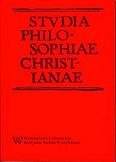Nowożytny spór o abstrakcję
Modern dispute over abstraction
Author(s): Kazimierz GryżeniaSubject(s): Philosophy
Published by: Wydawnictwo Naukowe Uniwersytetu Kardynała Stefana Wyszyńskiego w Warszawie
Keywords: intellect; abstraction
Summary/Abstract: The issue of modern dispute over abstraction undertaken in this article takes into consideration, above all, three authors: Cajetan (Thomas de Vio), Pedro da Fonseca and Francisco Suarez. Cajetan, as a member of the Dominican order, represented Thomistic thought and in the early phase of the modern period was the most influential. Fonseca was at the beginning of the forming of the Jesuit philosophical school, not burdened by the tradition of his order, that is either Thomistic or Scottish tradition. Suarez, Fonseca’s successor, was widely recognized in the 17th century. One should also remember that nominalism, even though quite fundamentally criticized at that time, had quite a significant impact. We deal here with merging of diverse orientations and the intention of this study is to show how the issue of abstraction was presented, with the special focus of Fonseca’s approach. Fonseca is not very well known, but his solutions decided not only the philosophical face of so-called ‘suarezianism’ but – as it is believed – were the link in shaping philosophical culture of next generations. There is no denying that all discussed authors show perceptiveness and inquisitiveness, hence multiple differentiations, divisions and subtle distinctions. This is what happens for example with the division of abstraction into formal and objective, typical and untypical, habitual and actual or with displaying different and separate functions of active intellect etc. Among various philosophical currents, quite a big influence of neo-Platonic spiritualism and nominalism can be noticed. An example of this tendency is Fonseca’s and Suarez’ theorem that idea is the model and material cause of abstract cognition. According to this conviction everything that is contained in idea must reflect in intellect. This way the difference between sensory and intellectual cognition, between subject and object is abolished. These findings confirm one of the interpretations that this is a step towards Cartesianism with its philosophy of the subject.
Journal: Studia Philosophiae Christianae
- Issue Year: 46/2010
- Issue No: 2
- Page Range: 219-238
- Page Count: 20
- Language: Polish

